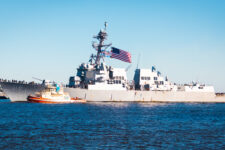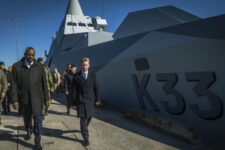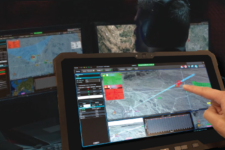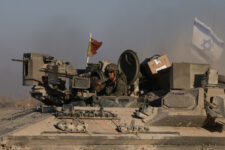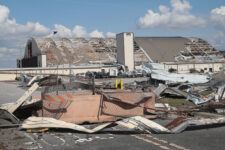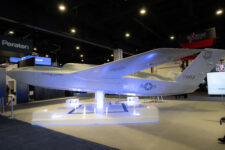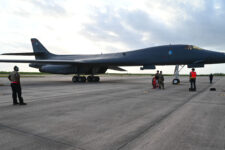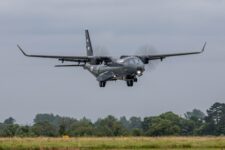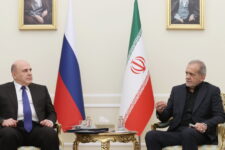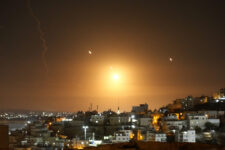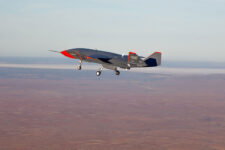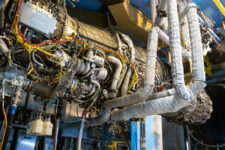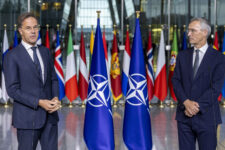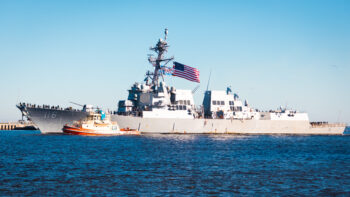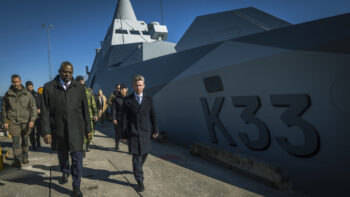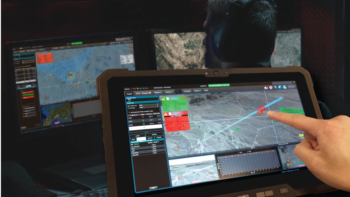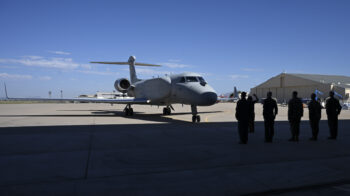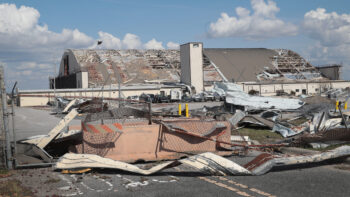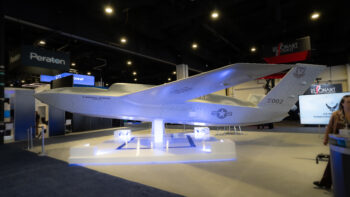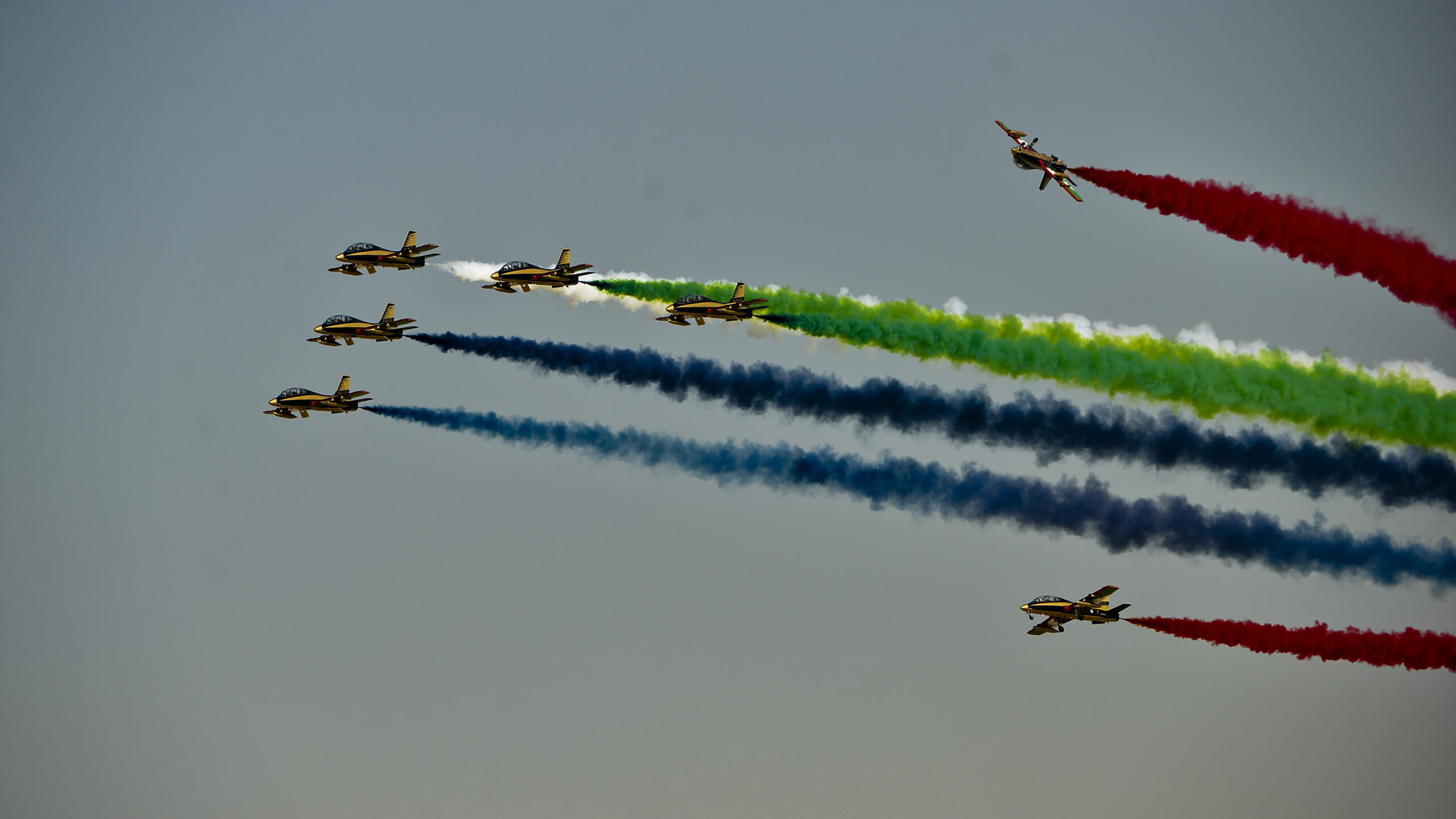
The “Al Fursan” (The Knights), the United Arab Emirates Air Force aerobatic display team performs during the Dubai Airshow Nov. 13, 2017. (U.S. Air Force/ Anthony Nelson Jr.)
DUBAI: Next week’s Dubai Airshow is slated to be the world’s largest aviation trade show since the start of the COVID-19 pandemic, bringing together military leaders and defense CEOs hoping to cement industrial partnerships and ring in major aircraft deals.
But while about 300 officials from the State and Defense Departments are anticipated to attend the event, senior Pentagon leaders will be largely absent, as the Biden administration struggles to find qualified candidates for key acquisition positions and get nominees through the confirmation process.
“The Biden administration, like the Trump administration, has gotten off to a slow start,” said Loren Thompson, a Lexington Institute analyst and frequent consultant for defense contractors. “Many key officials are not confirmed, and it’s awfully hard to show up with a full delegation when you have half a government.
“However, I think the Biden administration is proving much more pragmatic about arms sales than past Democratic administrations,” he said. “So I don’t think there’s a lack of interest. I just think there’s a temporary deficiency of personnel to appear.”
Air Force Chief of Staff Gen. CQ Brown, who will speak at the Dubai International Air Chiefs Conference on Saturday, will be the Defense Department’s most senior official at the show, which kicks off on Nov. 14.
Typically, the Pentagon and Air Force’s acquisition executives also attend the air show, but neither position has been filled.
Andrew Hunter, who the Biden administration nominated for the Air Force job in July, has not yet been confirmed by the Senate. Meanwhile, Defense Innovation Unit director Mike Brown. the administration’s first pick to become the Pentagon’s top weapons buyer, dropped out of the running in July, and the White House has not tapped another candidate for the job.
“Due to conflicting engagements” no other representatives from Pentagon’s acquisition and sustainment apparatus are able to attend the Dubai Air Show this year, said Pentagon spokeswoman Jessica Maxwell.
“However, the department is well represented by officials from other areas,” she said.
‘A surge of post-pandemic demand’
Brokering large arms sales on the ground in Dubai isn’t the norm for US officials, but Thompson predicts that after two years of mostly-virtual engagements, Gulf nations could be hungry to cement weapons deals in person with a handshake.
“The world is opening up again, and that means there will be a surge in post-pandemic demand for military systems, likely driven by the Persian Gulf region,” Thompson said.
For the first time ever, Israel will participate in the air show, following the 2020 Abraham Accords that normalized relations between Israel, the UAE and Bahrain. That could open the door for the three countries to entrench their partnership more deeply, said Mira Resnick, the deputy assistant secretary of state for regional security, who will arrive at the show on Sunday.
“President Biden has expressed his full support for strengthening these arrangements, expanding them around the world. The Dubai Airshow really represents the latest development in that effort,” she said in a Nov. 12 interview. “I do hope that we see more overt security cooperation between Israel and her new partners.”
Richard Aboulafia, an analyst with the Teal Group, expects continued calls from Gulf countries for greater levels of technology offset, with organizations like the UAE’s Strata Manufacturing brokering partnerships with companies such as Boeing and Airbus.
For defense, the event is “not really about sales. It’s about positioning. It’s about industry arrangements. That I think is gonna be really interesting, because there’s all this talk about a greater level of indigenization,” Aboulafia said.
“And if the UAE and others are intent on indigenizing, establishing a greater defense industrial base, Israel might be someone who they would work with for technology transfer and development,” he said.
With the UAE and other countries looking for partners, does a smaller-than-usual US delegation create a vacuum for other weapons manufacturers — including Russian and Chinese companies — to exploit?
Russia may have its chance to make its pitch at the show. Rostec, one of the nation’s state-owned defense firms, plans to exhibit a prototype of its Checkmate stealth fighter next week and could position the jet to the UAE as an alternative to the Lockheed Martin F-35.
However, Aboulafia doesn’t see the Russian jet as a threat to the F-35 or other US or European-made fourth-generation fighters on the market.
“The higher up the weapon system, the more you’re buying a strategic relationship. Do people really want a strategic relationship with Putin’s Russia?” Aboulafia said. “It’s not like there’s any feeling that they’re offering cutting edge stuff.”
China, however, is a different story.
Thompson speculated that China might be willing to undercut its competitors on weapons prices in order to enhance its own strategic goals, particularly improving its access to Middle Eastern oil or ports in the Persian Gulf.
And unlike Russia, China’s economic clout makes it an attractive partner, Aboulafia said.
“There are some products they offer with few strings attached, like drones, most notably, that are going to have appeal. And the Chinese probably regard that as a way of getting in there as a weapons provider,” he said.
F-35 not on display, but on the mind
Walking across the long flight line to see rows of aircraft on static display is a well-worn air show pastime, and this year the Defense Department is showcasing the KC-46 tanker, P-8 Poseidon and F-16 among other planes.
But while the F-35 will not be among the aircraft on display, it’s still bound to be a massive topic of conversation as questions swirl about whether a sale of the fifth-generation jet to the UAE is permitted to move forward.
At stake is a potential arms deal of up to 50 F-35 joint strike fighter aircraft, 18 MQ-9 Reaper drones and other weaponry worth about $23 billion.
However, the deal has stalled since January, allegedly due to Washington’s concerns about the UAE’s ties to China — specifically its use of Huawei networks, as well as intelligence reports that two Chinese military planes flew into a UAE airport and delivered unknown materiel, as reported by the Wall Street Journal in May.
Resnick said the United States remains “fully committed” to the sale and looks forward to further discussions with the Emiratis, but that the UAE must satisfy US concerns about technological security.
“I think that there are a number of obligations when it comes to technology security, that the UAE must be able to provide assurances on and and we are looking for clarification of those assurances,” she said. “I think we’ve been very clear with partners around the world, and this is not specific to the UAE … that untrusted vendors represent a threat to their own security [and] to US security.”
While the UAE deal remains in limbo, other Gulf countries could see the show as an opportunity to signal their interest in the F-35 to the United States.
“I think the biggest question is what the prospects are for selling the F-35 to Arab countries beyond the UAE,” Thompson said. “The F-35 is becoming a global standard for tactical aircraft, so there are obviously countries that can afford it and would like it, but haven’t yet been given the opportunity.”
Those nations could include Qatar, which is set to receive its first F-15QA from Boeing this year, and Kuwait, which took delivery of its final F/A-18E/F Super Hornet in September, Thompson said.
